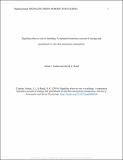Signaling when no one is watching: A reputation heuristics account of outrage and punishment in one-shot anonymous interactions.
Author(s)
Jordan, Jillian J; Rand, David G
DownloadSubmitted version (949.3Kb)
Open Access Policy
Open Access Policy
Creative Commons Attribution-Noncommercial-Share Alike
Terms of use
Metadata
Show full item recordAbstract
© 2019 American Psychological Association. Moralistic punishment can confer reputation benefits by signaling trustworthiness to observers. However, why do people punish even when nobody is watching? We argue that people often rely on the heuristic that reputation is typically at stake, such that reputation concerns can shape moralistic outrage and punishment even in one-shot anonymous interactions. We then support this account using data from Amazon Mechanical Turk. In anonymous experiments, subjects (total n = 8,440) report more outrage in response to others' selfishness when they cannot signal their trustworthiness through direct prosociality (sharing with a third party)-such that if the interaction were not anonymous, punishment would have greater signaling value. Furthermore, mediation analyses suggest that sharing opportunities reduce outrage by influencing reputation concerns. Additionally, anonymous experiments measuring costly punishment (total n = 6,076) show the same pattern: subjects punish more when sharing is not possible. Moreover, and importantly, moderation analyses provide some evidence that sharing opportunities do not merely reduce outrage and punishment by inducing empathy toward selfishness or hypocrisy aversion among non-sharers. Finally, we support the specific role of heuristics by investigating individual differences in deliberateness. Less deliberative individuals (who typically rely more on heuristics) are more sensitive to sharing opportunities in our anonymous punishment experiments, but, critically, not in punishment experiments where reputation is at stake (total n = 3,422); and not in our anonymous outrage experiments (where condemning is costless). Together, our results suggest that when nobody is watching, reputation cues nonetheless can shape outrage and-among individuals who rely on heuristics-costly punishment.
Date issued
2020Department
Sloan School of ManagementJournal
Journal of Personality and Social Psychology
Publisher
American Psychological Association (APA)